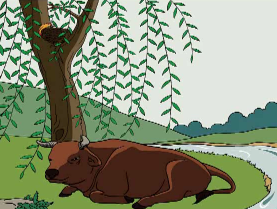After a while the tinker laid down the knife, took the stick in both hands, and gave it a little twist. At once, grandfather heard something pop. Then he saw the bark slip from the stick above the knife-cut, all in one long, round piece.
過了一會(huì)兒,修補(bǔ)匠放下刀,雙手握住樹枝輕輕擰了一下。祖父立刻聽到什么東西爆了。然后,他看到刀口上的樹皮滑落下來,都是長(zhǎng)長(zhǎng)的圓片。
After this the old man cut away more than half of the part of the stick from which he had slipped the bark. Across the upper end he made a smooth, slanting cut.
在這之后,老人切掉了大半刮掉樹皮的樹枝。他在樹枝頂端切了一個(gè)光滑、傾斜的切口。
Then he told grandfather to wet the stick again, after which he slipped the bark back to its place.
然后他又叫祖父把樹枝打濕,然后把樹皮塞回原處。
The old tinker put the end of the stick in his mouth, placed his fingers over the smaller notches, and began to blow. As he lifted first one finger and then another, out of the deep notch came sweet music like the voice of a bird singing a long way off.
老修補(bǔ)匠把樹枝末端放進(jìn)嘴里,手指放在小凹口上,開始吹氣。當(dāng)他抬起第一根手指,然后又抬起另一根時(shí),凹口處傳出美妙的音樂,就像鳥兒在遠(yuǎn)處歌唱。
While the old man played, he seemed to forget all about grandfather. By and by he laid down the whistle, smiled and said, "Come. Bring the whistle. Now we shall make the tree."
老人演奏完后,似乎忘了我祖父的存在。不久之后,他放下了哨子,笑著說:“來吧,帶上口哨,現(xiàn)在我們來種樹。”

They walked down to the brook together, and crossed over on some stepping-stones to a place where the ground was soft and black and wet. While the boy held the stick, the old man pushed it far down into the mud until it stood up straight, with the whistle at the upper end.
他們一起走到小溪邊,跨過一些踏腳石,來到了一塊濕軟的黑土地上。男孩拿著樹枝,老人把它往下深埋到泥里,直到它站直了,又把口哨放在了它的頂端。
Then the old man bowed to the stick, and said: "Little brother, we leave you here, where you will never be hungry or thirsty. You have made your sweet music for us today. But when you have grown tall and strong, gentle winds will make even sweeter music among your branches."
然后,老人向樹枝鞠了一躬,說道:“小兄弟,我們把你留這兒了,你既不會(huì)餓,也不會(huì)渴。你今天為我們演奏了美妙的音樂。但當(dāng)你長(zhǎng)得又高又壯的時(shí)候,微風(fēng)會(huì)在你的樹枝間奏出更甜美的音樂。”
A little while after that the old man put on his pack and went away; but my grandfather could not forget him or what he had done.
一段時(shí)間之后,老人帶上他的包離開了;但我的祖父沒有忘記他或者他的所作所為。
Almost everyday the little boy looked at the stick by the brook. The whistle at the top began to dry up, and the loose bark cracked open and fell off, until it seemed as if the whole stick must be dead.
小男孩幾乎每天都會(huì)去看小溪旁的樹枝。它頂端的口哨開始風(fēng)干了,松松的樹皮裂開掉了下來,看起來好像整個(gè)樹枝都死了。
But one day my grandfather saw a tiny bud below the place where the whistle had been. The bud became a little sprout, and the sprout became a little branch. Then other branches followed, until the stick was indeed a little tree.
但是有一天,我的祖父在口哨所在的地方看到了一個(gè)萌芽。萌芽變成了小芽,最終長(zhǎng)成了一條樹枝。然后,其他的樹枝也冒出來了,直到樹枝變成了一棵小樹。
Year after year, it grew taller and stronger, until "The Tinker's Willow" was known as the greatest tree in all the countryside. The birds did, indeed, build their nests among its branches, the winds made sweet music among its leaves, and the cattle lay in its shade on hot summer days.
年復(fù)一年,“修補(bǔ)匠柳樹”變得越來越高,越來越壯,最終成為全村最偉大的樹。鳥兒確實(shí)在樹枝間筑巢了,微風(fēng)在樹葉間演奏著悅耳的音樂,牛在夏天躺在樹蔭下乘涼。












